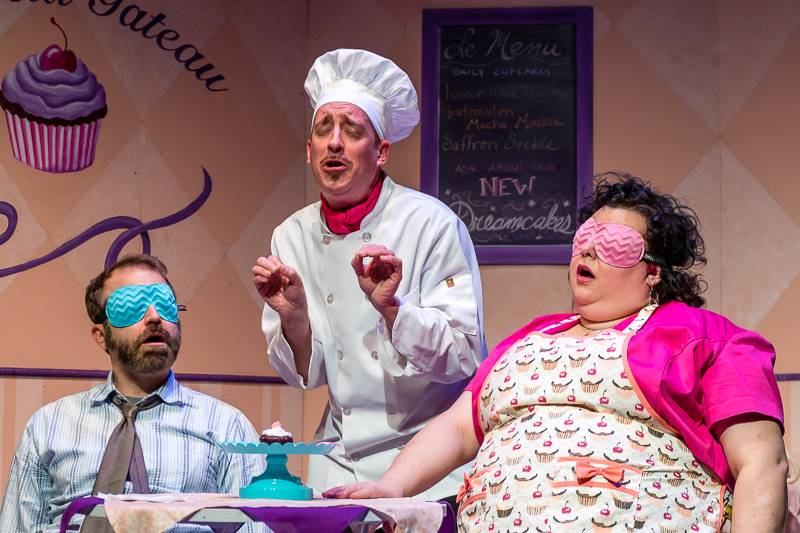The Celebration Company at the Station Theatre began the winter portion of their 44th season of performances with Lisa Dillman’s American Wee-Pie on Thursday, January 21st. The two-act play centers around familiar themes of reinvention, self-discovery, small town life, and destiny. There are also baked goods… and who doesn’t like baked goods? Like the daikon-radish-dried-pear-curry-chocolate-wasabi cupcake used in the play, American Wee-Pie crams an alarming number of elements into a story about changing one’s life. Dynamic character development, sound design, visual touches, and setting of the play all ask audience members to have knowledge of the cupcake boom and bust of the late Aughts. The Celebration Company handled these themes well to provide an enjoyable experience.
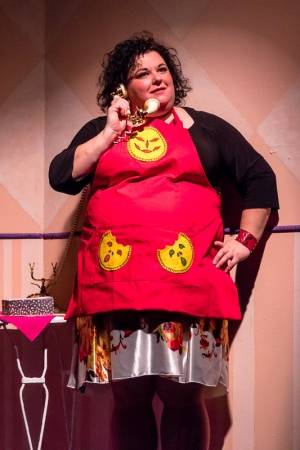 Relatable and familiar, the cast of American Wee-Pie bring the fictional town of Gardensend to life. We have: the shy man brought home by tragedy and looking for something better out of life without realizing it; the overly bubbly cupcake entrepreneur looking to make it big; the unhappy, older sibling feeling the obligation of “staying behind” to care for an elderly family member; the happy local who quietly sees his small community change and yet remain unchanged; and the reinvented man doubting his life’s decisions to run away from the family name and past.
Relatable and familiar, the cast of American Wee-Pie bring the fictional town of Gardensend to life. We have: the shy man brought home by tragedy and looking for something better out of life without realizing it; the overly bubbly cupcake entrepreneur looking to make it big; the unhappy, older sibling feeling the obligation of “staying behind” to care for an elderly family member; the happy local who quietly sees his small community change and yet remain unchanged; and the reinvented man doubting his life’s decisions to run away from the family name and past.
The cast brings these unique characters to life especially well through the use of voice to convey personality. Julia Megan Sullivan as Linz Gofferty captured that energetic know-it-all who edges on being irritating. At the moment you think Linz will froth over into annoyance, Sullivan pulls her back from the brink. In doing so, you feel for Linz and her cupcake shop, Le Petit Gâteau, when the second act’s conflict hits. I also particularly enjoyed Grant Morenz’s comical Pableu Depardieu’s accent and William L. Kephart’s  deft handling of different Midwestern personalities. I couldn’t suppress a giggle when Pableu’s accent slipped from exaggerated French to Cajun a la Justin Wilson. The accent and character were a wonderful contrast to everyone else in the cast. Comparatively, Kephart’s quiet postman Malcolm differed greatly from the loud and the brash spectre of Phil and the funerary plot agent Pete looking for a sale. Eric Beckley as Tim “Zed” Zedlicki, with his hands in his pockets and mumbling, reminded me of my painfully shy high school classmates. The natural way in which the actors presented such complex characters helped me to understand and better relate to them on an individual level.
deft handling of different Midwestern personalities. I couldn’t suppress a giggle when Pableu’s accent slipped from exaggerated French to Cajun a la Justin Wilson. The accent and character were a wonderful contrast to everyone else in the cast. Comparatively, Kephart’s quiet postman Malcolm differed greatly from the loud and the brash spectre of Phil and the funerary plot agent Pete looking for a sale. Eric Beckley as Tim “Zed” Zedlicki, with his hands in his pockets and mumbling, reminded me of my painfully shy high school classmates. The natural way in which the actors presented such complex characters helped me to understand and better relate to them on an individual level.
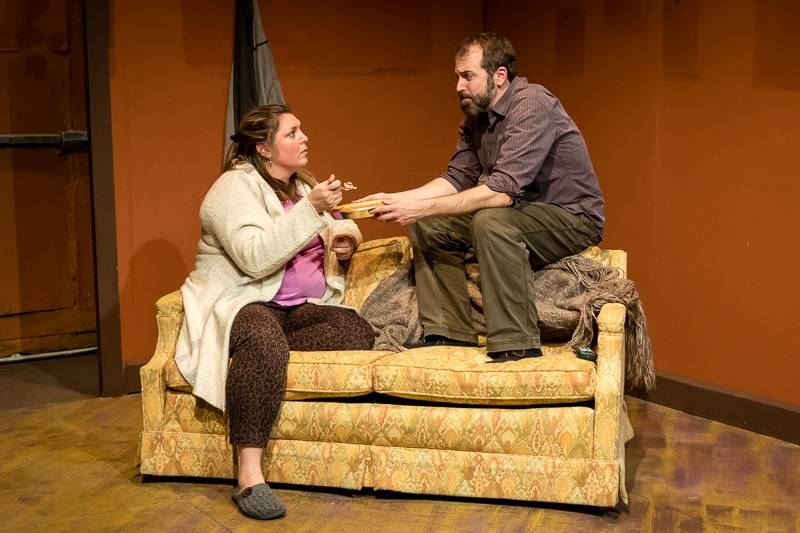
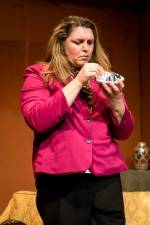 Despite being adept at accents, what didn’t get accentuated in the second act was Pam Zedlicki’s narrative arc. When we first meet Jenette Jurczyk as Pam, she is sitting in a pose that Tim says “looks like Mom”. As the play progresses, Pam leaves her funeral-like cubicle job to sell grassy plots in graveyards. Jurczyk also changes her vocal and physical performance to convey Pam’s change, but playwright Dillman doesn’t have Tim comment on the transformation. Perhaps the transformation didn’t need to be pointed out verbally to the audience, but I expected a comment to bookend the character’s change.
Despite being adept at accents, what didn’t get accentuated in the second act was Pam Zedlicki’s narrative arc. When we first meet Jenette Jurczyk as Pam, she is sitting in a pose that Tim says “looks like Mom”. As the play progresses, Pam leaves her funeral-like cubicle job to sell grassy plots in graveyards. Jurczyk also changes her vocal and physical performance to convey Pam’s change, but playwright Dillman doesn’t have Tim comment on the transformation. Perhaps the transformation didn’t need to be pointed out verbally to the audience, but I expected a comment to bookend the character’s change.
During the play, clever sound elements by sound designer Brian Hagy punctuated the comedic aspects of the characters or the scene. The possessed television set of Tim  and Pam’s mother blares a sharp comment from Bea Arthur in The Golden Girls. In the bakery, Pableu plays a lovely tune prior to the dreamcake blind taste test, and when the taste test goes awry, a funeral dirge accentuates his mood. Later, the television informs the audience of Le Petit Gâteau’s success in the style of a morning news report. My favorite element, however, was the use of the static buzz for the dream sequences. I didn’t recognize the noise at first. In the dream sequences, Phil visits Tim by the flickering lamp post. Phil’s harsh clown horn cut through the din of the speaker fuzz or television snow buzz overlaying the scene. The sound elements helped to set the play firmly in its time period and cover key points in the play’s narrative.
and Pam’s mother blares a sharp comment from Bea Arthur in The Golden Girls. In the bakery, Pableu plays a lovely tune prior to the dreamcake blind taste test, and when the taste test goes awry, a funeral dirge accentuates his mood. Later, the television informs the audience of Le Petit Gâteau’s success in the style of a morning news report. My favorite element, however, was the use of the static buzz for the dream sequences. I didn’t recognize the noise at first. In the dream sequences, Phil visits Tim by the flickering lamp post. Phil’s harsh clown horn cut through the din of the speaker fuzz or television snow buzz overlaying the scene. The sound elements helped to set the play firmly in its time period and cover key points in the play’s narrative.
Aside from the characters and set design, the script of American Wee-Pie relies heavily on the audience’s knowledge of the cupcakery boom and bust of recent years. We saw the rise of cupcake-centric bakeries, and we enjoyed the tasty small cakes piled high with frosting. Food Network’s Cupcake Wars taught us what made a good or bad cupcake. We checked Etsy for cute cupcake-themed aprons, headbands, and shirts. We fell in love with cupcakes and then fell out of love with our own personal pieces of cake kissed by frosting. We were sick of getting cavities.
The play’s reliance of these experiences moves beyond general knowledge. If you aren’t familiar with those elements, you probably don’t understand why Pableu Depardieu’s dreamcakes are so ridiculous. Or why the contrast of Linz’s crafty cupcake apron and Pableu’s chef’s whites to Tim’s Mom’s apron is visually important to the play. The rock and roll ‘80’s style montage effect for Tim’s transformation plays well for a laugh (and Beckley keeps the moment from getting silly). He is a stark contrast from the vivacious, vibrant, and vivid chefs and homebakers of the culture at that time in a old flower print apron and brown edged oven mitt.. Because of that, we think he doesn’t have a snowball’s chance in Hell. Yet I couldn’t help but remember my own great-grandmother in the same housecoat-style apron baking up a delicious storm of angel food and pound cakes from fresh farm eggs. Our baking ancestors didn’t need exotic ingredients or a camera crew to make the world a little sweeter. I wondered how many other audience members saw that contrast of times or if that subtle detail was left in the batter bowl.
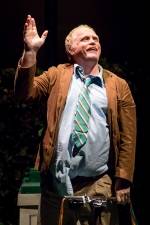 Overall, American Wee-Pie was an enjoyable romp in a small, somewhat familiar town filled with recognizable characters. The Station Theatre presented a great cast who deftly handled every aspect of their characters and helped the audience to understand the context of Dillman’s play. I look forward to what the Celebration Company handles next this season.
Overall, American Wee-Pie was an enjoyable romp in a small, somewhat familiar town filled with recognizable characters. The Station Theatre presented a great cast who deftly handled every aspect of their characters and helped the audience to understand the context of Dillman’s play. I look forward to what the Celebration Company handles next this season.
American Wee-Pie can be seen at the Station Theatre from Wed. Jan. 27 – Sun. Jan 31 and Wed. Feb. 3 – Sat. Feb. 6 at 8 p.m. Wednesday, Thursday, and Sunday tickets are $10 while Friday and Saturday performances cost $15. Make a reservation online or by calling the ticket office at (217) 384-4000.
All photos by Scott Wells.








